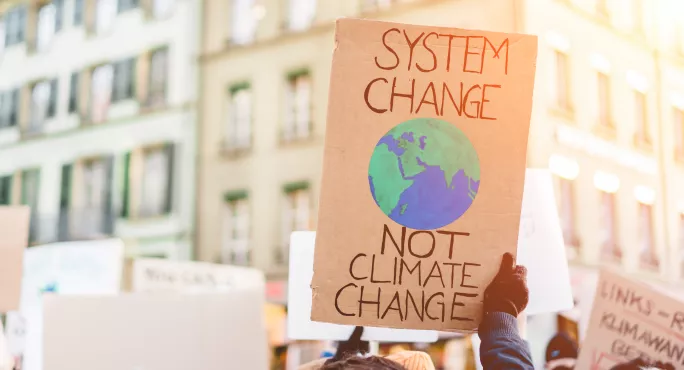- Home
- Politicians say they want kids to engage in social action, but when they do...
Politicians say they want kids to engage in social action, but when they do...

Today, thousands of schoolchildren have walked out of school in protest at a lack of action on climate change. This is exactly the sort of brave, informed and engaged behaviour we should be trying to encourage through education, is it not? And yet their social action has been met with vocal disapproval from educators and the Department for Education.
At first glance, education secretary Damian Hinds has no choice but to condemn school strikes. As secretary of state, his job is to ensure the nation’s compulsory education. Likewise, figures such as Geoff Barton, general secretary of the Association of School and College Leaders, and Toby Young, the free-school pioneer, who have committed themselves to the cause of comprehensive education, might find it difficult to accept that anything - even the viability of life on earth - could be more important than a day at school.
But headteachers, educators and, yes, even the Department for Education are at risk of being on the wrong side of young people’s education - as well as on the wrong side of history - if they seek to oppose today’s protests.
Almost the entirety of Britain’s educational establishment has spent the past six years championing the role of social action in a young person’s education, by supporting the cross-party #iwill campaign. The list of supporters includes Ofsted, the Association of Colleges, the NAHT heads’ union and, yes, the Department for Education. What else did they have in mind, encouraging young people to go and take “practical action” on the causes they care about? The hypocrisy is staggering.
- Meet the UK pupils striking against climate change
- Hinds: Climate strike would increase teacher workload
- ‘The climate strikes threaten the safety of our pupils’
- ‘Climate change is already taught in schools’
It was only one week ago that Mr Hinds himself set out his “five foundations for character” - one of which being social action - in a speech that also celebrated a £40 million Government fund set up to support the very kind of social action and campaigning activities that schoolchildren are engaged in today.
There are enormously good reasons for the near-universal support that has been behind the #iwill campaign. Social action has been shown to provide an enormous benefit for young people’s character and non-academic skills - top priorities for educators in a rapidly changing world.
The pupil strike is a learning opportunity
Any capable teacher or headteacher can use today’s strike as a powerful learning opportunity. Here are kids who are engaged enough with the issues of our time to take bold and concerted action. What better opportunity could there be to teach those issues in the classroom - to link the pupils’ passion for social change to academic learning, such as the mathematics of carbon emissions or the economic and geographic implications of a transition to a sustainable economy?
So what is the problem? Well, some have suggested that social action is all very well and good for schoolchildren, but not at the cost of their education. Toby Young even said that the protests should have taken place at the weekend instead.
At the risk of hyperbole, I’m afraid that sounds a bit like asking Rosa Parks to protest against racial segregation from the bus stop so as not to disrupt public transport. The entire point of walking out of school is to demonstrate that adults in positions of responsibility have abrogated their duty to the next generation and broken the social contract. If we want young people to be engaged citizens, then we need to accept that part of this will involve them having the power to make their voices heard.
I guess the problem goes far deeper. Educators have been happy to hop on the social action bandwagon because they have had a patronising view of what young people are capable of, and a diminished expectation about how much impact their social action should have on society. Social action is fine, so long as it involves obedient children and the status quo. Social change? Not so much.
Well at Generation Change, we believe that young people should be involved in the messy, difficult work of social change. That’s where they are really going to flourish and develop into mature adults - when they are entrusted to act as responsible agents of change in a world desperately crying out for people to act.
Isn’t that what education is all about? Cultivating the sort of capable citizens that can engage with society as equals?
David Reed is director of Generation Change
Keep reading for just £1 per month
You've reached your limit of free articles this month. Subscribe for £1 per month for three months and get:
- Unlimited access to all Tes magazine content
- Exclusive subscriber-only stories
- Award-winning email newsletters